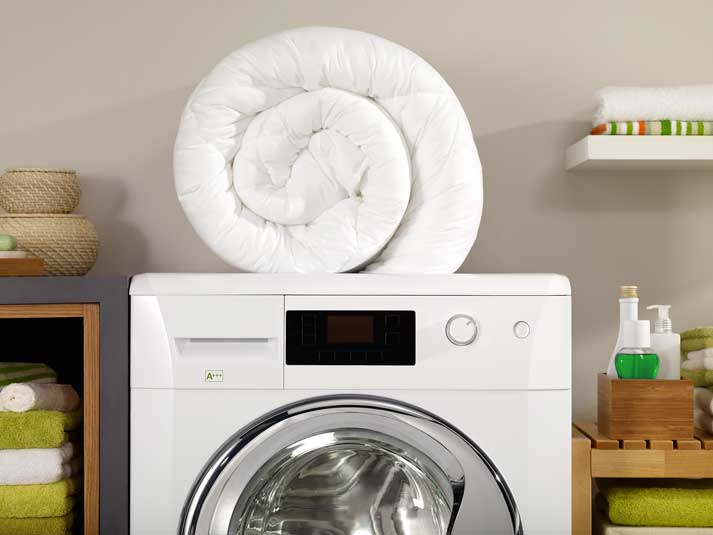
Though there are many theories about why we sleep, there is one thing we know for sure: good rest is an essential part of a healthy life. The CDC recommends 7 or more hours of sleep per day for adults, but it’s far more for kids. Infants, for example, can doze away up to 16 hours a day! That’s quite a bit of time for people of all ages to spend in bed.
Adopting proper sleep habits, a.k.a. “sleep hygiene” is unsurprisingly a key factor to ensuring that you, your family, and your guests get enough rest. One essential habit for promoting a restful slumber is ensuring that your bedroom is a clean, calm, and relaxing space. If your comforters are rumpled or dirty, you and those you care for may find it is not so easy to fall into a deep sleep.
Luckily, properly caring for comforters is easier than it seems. Let’s dive into the basics.
How often should you clean your comforters?
The answer is… it depends.
The general rule of thumb is that if your comforter has a duvet, you can get away with cleaning the comforter itself yearly. On the other hand, if you’re duvet-free, you should wash it quarterly. But there are circumstances in which you should clean it far more frequently.
For example, many of us allow our pets on the bed. As every pet owner knows, fur, dirt, and dander accumulate quickly. In this circumstance, we recommend increasing your comforter washing schedule to once every two months.
Asthma or allergy sufferers may need to clean comforters even more frequently. Unclean bedding can increase symptoms which makes it harder to practice proper sleep hygiene. At a minimum, wash your comforter every two months, but once a month is preferable if you can manage it.
Is it better to dry clean or machine wash?
Your mom was right when she told you to check the care label. To answer this question for yourself, make sure to read each tag carefully and thoroughly to ensure you know which method is best. If you don’t know how to read the symbols, visit this handy guide here.
If it’s dry clean only, don’t try to take matters into your own hands or you risk ruining your comforters. Don’t worry, dry cleaning this item is faster and more affordable than you might expect but only take them to a cleaner you trust. If you are close to our Metro-Detroit location, feel free to bring yours to us.
So what if your tag says to machine wash your comforter? It may be tempting to stuff it into your home washing machine but check to make sure you are not potentially overloading it. If it doesn’t fit, not to worry. Many reputable dry cleaners and laundromats offer larger washing machines which will easily manage the job.
Let’s say your comforter fits comfortably into your home washing machine. Your first step is to carefully pre-treat the item by targeting any marks found with an appropriate stain remover. Use a warm water cycle. Go ahead and use the drier, but keep it on very low heat. This may mean running it through 2 or even 3 cycles to ensure that the innermost part of the comforter is free from moisture. If this seems like too much work, you can get away with line drying your comforter outside if your filling is cotton or polyester, but if it’s down, forget it!
How can you reduce wrinkles?
It’s not easy to slide into a healthy rest in a messy room with a wrinkled comforter. Creating a tidy space helps relax the mind and puts you, your family or your guests at ease. If you are able to machine wash yours, you can reduce wrinkles by transferring it as quickly as possible to the drier while ensuring you are following the advice above to dry it slowly on low heat over an extended period of time.
When it’s ready, remove the comforter from the drier quickly, fold it or place it back on the bed right away. Should you still have wrinkles, an iron is not your friend. Rather, using a steamer is your best bet. The heat and dampness of the steamer will gently smooth out stubborn wrinkles without causing damage as long as you follow the machine’s instructions.
A few final tips:
Storage: When it comes time to store your comforters, check first that they are clean, then place them in a breathable bag, i.e. not plastic. Natural fabrics like cotton should work quite well.
Top Sheets: To extend the time between washes, we absolutely recommend the use of a fitted and top sheet. We are well aware that millennials are not top sheet fans and tend to find them fussy but they do decrease the need to clean your comforter quite so frequently. Do remember, however, that all sheets should be cleaned or changed out weekly. If they are color-safe, go ahead and soak them in Oxyclean™ or a similar stain remover if they have marks.
White Vinegar: White vinegar is a frugal cleaner’s best friend. In place of fabric softener, which can stick to down, use this odorous liquid in its place. White vinegar will fully, naturally, and effectively flush soap from your comforter without leaving a scent.
Keeping your comforters clean and tidy is an essential part of good sleep hygiene. By adopting these comforter cleansing habits in your home, hotel, bed and breakfast, or rental, you provide yourself, loved ones or guests with a healthy resting space.
Let us help you maintain this great habit. Our pickup and dropoff service can swing by for your comforters at your convenience and we will take care of the rest.
Still have questions? Leave us a comment below.
Photo Credit: gerenme
Explore Our Dry Cleaning Services
Learn more about the dry cleaning services we offer at Janet Davis Cleaners!
